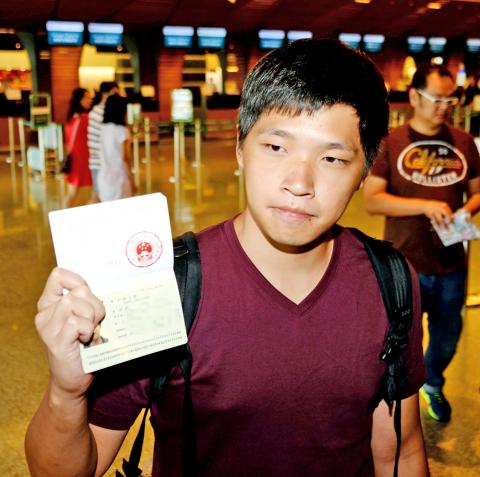Sunflower movement leader Chen Wei-ting (陳為廷) was denied entry to Hong Kong yesterday after he tried to go to the former British colony to participate in the pro-democracy movement there.
After returning to Taiwan Taoyuan International Airport, Chen recounted his experience, saying that immigration officers had taken him aside while he was passing through customs at Hong Kong International Airport and led him to a small room.
Chen said the officials told him that his “Taiwan compatriot’s travel document” (台胞證) — a permit issued by Chinese authorities allowing Taiwanese to travel to China that can also be used to enter Hong Kong — had been nullified.

Photo: CNA
However, Chen said the document was not due to expire until 2018.
The Sunflower leader said the officials searched him, which added to his feeling that he was being treated like a terrorist.
He was then escorted by the officers onto a flight bound for Taiwan that departed at 5:45pm and arrived at Taoyuan International Airport at about 7:30pm.
Prior to departing from the Taoyuan airport at 2pm yesterday, Chen said he was going to Hong Kong to join in activists’ fight for democracy.
“I hope that Beijing and the Hong Kong government will not try to block the interaction and exchanges between civic groups in Taiwan and in Hong Kong,” he said. “If Hong Kong decides to deport me, I will have no choice but to come back, but I’d like to see how the Mainland Affairs Council will react, since it once said that it would try to give me a hand in such matters.”
Chen was referring to Hong Kong authorities’ denial of visa applications filed by himself and his fellow Taiwan March cofounders Lin Fei-fan (林飛帆) and Huang Kuo-chang (黃國昌) last week.
The trio had intended to join pro-democracy demonstrations taking place in the territory.
Despite their failure to get visas, Chen decided to travel to Hong Kong anyway using his “Taiwan compatriot’s travel document.”
Lin and Huang could not accompany him, as they do not have the travel permit.
Chinese dissident Wang Dan (王丹), who is living in exile in Taiwan, expressed support for Chen’s efforts on Facebook, writing: “Although he was denied a visa, Chen still decided to go to Hong Kong [yesterday]. He may not be allowed into Hong Kong, but our friends in Hong Kong should get a clear message: Those who participated in Taiwan’s Sunflower movement will be standing firmly together with the force for democracy in Hong Kong.”
“The demonstration on July 1 [tomorrow] is coming — Hong Kongers, you are not alone,” Wang posted.
Additional reporting by Yao Chi-hsiu

FREEDOM OF NAVIGATION: The UK would continue to reinforce ties with Taiwan ‘in a wide range of areas’ as a part of a ‘strong unofficial relationship,’ a paper said The UK plans to conduct more freedom of navigation operations in the Taiwan Strait and the South China Sea, British Secretary of State for Foreign, Commonwealth and Development Affairs David Lammy told the British House of Commons on Tuesday. British Member of Parliament Desmond Swayne said that the Royal Navy’s HMS Spey had passed through the Taiwan Strait “in pursuit of vital international freedom of navigation in the South China Sea.” Swayne asked Lammy whether he agreed that it was “proper and lawful” to do so, and if the UK would continue to carry out similar operations. Lammy replied “yes” to both questions. The

‘OF COURSE A COUNTRY’: The president outlined that Taiwan has all the necessary features of a nation, including citizens, land, government and sovereignty President William Lai (賴清德) discussed the meaning of “nation” during a speech in New Taipei City last night, emphasizing that Taiwan is a country as he condemned China’s misinterpretation of UN Resolution 2758. The speech was the first in a series of 10 that Lai is scheduled to give across Taiwan. It is the responsibility of Taiwanese citizens to stand united to defend their national sovereignty, democracy, liberty, way of life and the future of the next generation, Lai said. This is the most important legacy the people of this era could pass on to future generations, he said. Lai went on to discuss

SECOND SPEECH: All political parties should work together to defend democracy, protect Taiwan and resist the CCP, despite their differences, the president said President William Lai (賴清德) yesterday discussed how pro-Taiwan and pro-Republic of China (ROC) groups can agree to maintain solidarity on the issue of protecting Taiwan and resisting the Chinese Communist Party (CCP). The talk, delivered last night at Taoyuan’s Hakka Youth Association, was the second in a series of 10 that Lai is scheduled to give across Taiwan. Citing Taiwanese democracy pioneer Chiang Wei-shui’s (蔣渭水) slogan that solidarity brings strength, Lai said it was a call for political parties to find consensus amid disagreements on behalf of bettering the nation. All political parties should work together to defend democracy, protect Taiwan and resist

By refusing to agree spending increases to appease US President Donald Trump, Spanish Prime Minister Pedro Sanchez threatened to derail a summit that NATO Secretary-General Mark Rutte needs to run smoothly for the sake of the military alliance’s future survival. Ahead of yesterday’s gathering in The Hague, Netherlands, things were going off the rails. European officials have expressed irritation at the spoiler role that Sanchez is playing when their No. 1 task is to line up behind a pledge to raise defense spending to 5 percent of GDP. Rutte needed to keep Spain in line while preventing others such as Slovakia